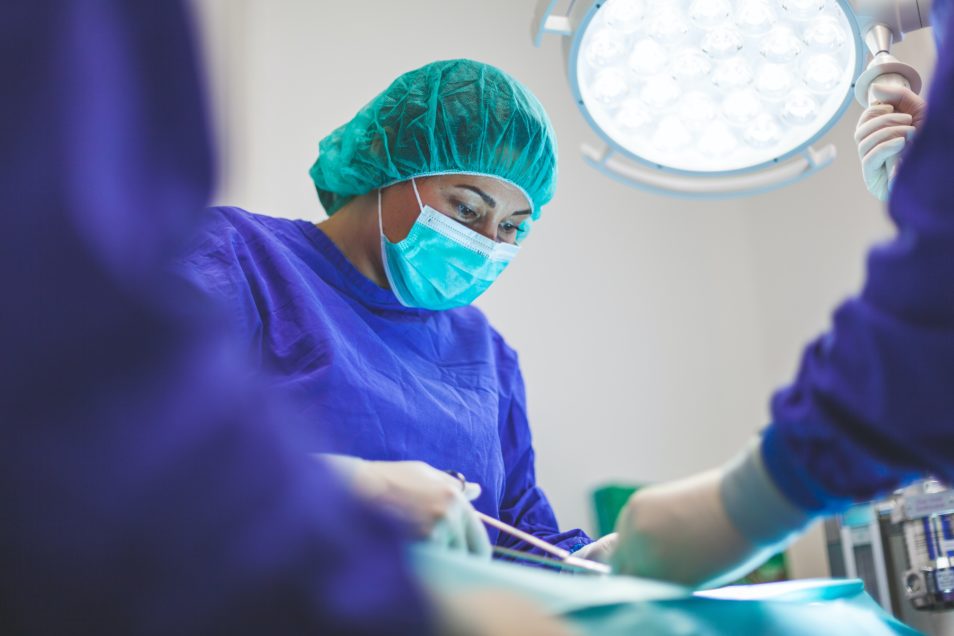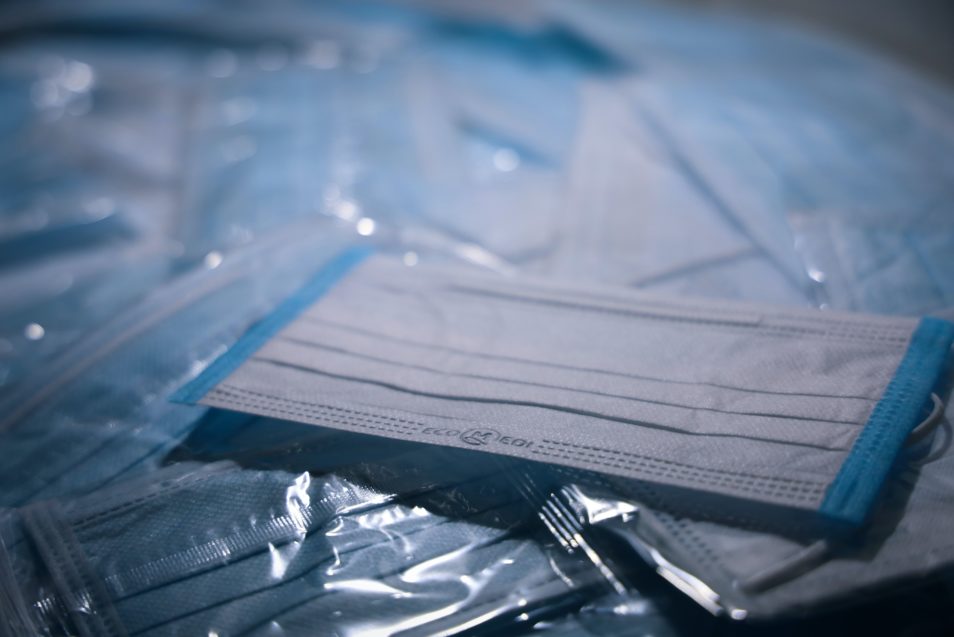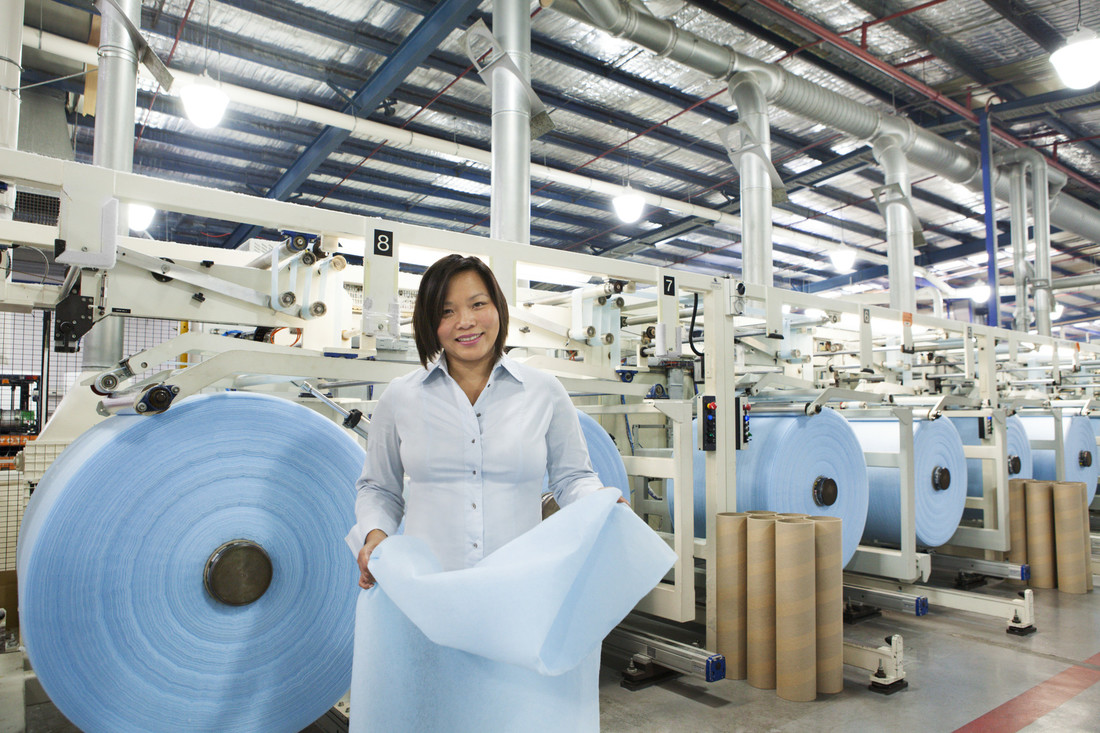
Surgical face masks have come to be the global symbol of COVID-19.
You will have seen the tired faces of front line doctors and nurses around the world, bruised from continual face mask wearing.
You’re probably also aware we have limited supplies for these front-line workers because so many other people are stocking up and there have been disruptions to the global supply chain.
More people have started wearing face masks here in Australia too. Staff at the local GP, shop keepers and the general public are all hoping they will fend off the virus.
But when is wearing a face mask actually beneficial? And with surging demand and broken global supply chains, how can we be sure we’ll have enough?
It’s important to understand when surgical face masks provide protection. And when they don’t. The Australian Department of Health says face masks are of most benefit to health care workers in frequent close contact with sick people. And to those who already have COVID-19. This is so they don’t cough on others and spread the disease.
How do surgical face masks work?
A surgical face mask protects those working closely with infected people from others’ coughs and sneezes. Coughs and sneezes send out droplets of bodily fluids that may contain germs or respiratory viruses. You can also wear a mask if you are sick to protect others from your bodily fluids.
Surgical masks are made from felt that is fine enough to filter out most small particles, including pathogens. To be effective you must wear them according to the manufacturers’ instructions. It’s important not to touch the mask until you remove it. They’re also single-use so you need to dispose of them after wear.

Face masks are in demand during the Covid-19 pandemic.
Addressing a global shortage
COVID-19 began impacting Australia in February 2020. Early on surgical face masks were identified as an important resource in the fight against the virus. By mid-March confirmed cases were rising and this caused a surge in global demand.
With a disrupted global supply chain, local manufacturers have been addressing shortages of medical equipment and the materials to make them. Manufacturing businesses responded quickly.
Local manufacturer Textor Technologies was one of these companies. It has been adapting its facilities to make the special filtration fabric suitable for supply to local companies that manufacture surgical face masks.
Using our Pilot-Scale Production Facility at Waurn Ponds, near Geelong in Victoria, Textor has been working to speed up development and manufacture of certain filtration fabric. We’ll test the performance of the fabric before it goes on to testing against Australian Standards. If successful, Textor may produce the material at commercial scale.
Local businesses to the rescue
Surgical mask manufacturer Med-Con will use suitable material to make the finished surgical masks. Until recently, this small company in country Victoria had been Australia’s only manufacturer of surgical masks.
Med-Con typically produces around two million masks per year out of its Shepparton facility. But as a result of COVID-19, the small business is now increasing its production by at least tenfold. This will mean introducing more machines to its factory and increasing its workforce to cope with the demand.
Our agile manufacturers are rising to the COVID-19 challenge. Businesses like Textor and Med-Con are trying to ensure Australia’s medical professionals are better equipped to treat patients with the virus.

We helped develop moisture-trapping fabric with Textor Technologies.
Designing 3D printed masks
In another Team Australia approach, we have been working with Flinders University, University of South Australia and Detmold to provide advice and equipment for a new mask testing facility in South Australia, which will test locally made respirators and surgical masks.
Our data and technology science specialists at Data61 are also using 3D printing to produce two designs of protective face shields for Queensland healthcare workers. While usually reserved for research purposes, we’re using nearly all our polymer 3D printers to print short runs of shield frames as part of a state-wide collaborative effort. We expect to be supplying 300 to 500 units this month. This contribution will ensure that Queensland healthcare workers have sufficient protective equipment available to meet current demands while Australian industry adapts to mass manufacture these kinds of items.
Further tips on face-mask wearing during COVID-19 can be found via the Australian Government’s Department of Health.


17th May 2020 at 10:22 am
it´s all good to manufacture these masks but where can the public buy them as all have seen are made in China
15th May 2020 at 7:36 am
Hi,
I’m looking to start making home-made face-covers to donate to people in my community. These would not be surgical masks, only covers for every-day usage (ie. going to the shops or taking a walk). I have read that they’re useful in combating the spread of COVID-19 as they stop the person wearing it from spreading any sort of droplets.
I was inspired by a news-story I saw in britain, and found the Center of Disease Control instructions to making masks. However, these masks are made to fit the US requirements. Are there any different guidelines for making Australian masks, or can I use the pattern provided on CDC? The pattern can be found here –https://www.cdc.gov/coronavirus/2019-ncov/prevent-getting-sick/diy-cloth-face-coverings.html
Thank you very much,
Jay
3rd May 2020 at 7:48 pm
Hi I have been looking buy Australian made face masks for 4 weeks I understand that the first masks made are to be used by and supplied to heath care workers first. Can you please confirm Australian made masks will be available to buy for Australian citizens any time soon .
And not hoarded by overseas buyers and sent overseas. I have just seen a video of the poor hygiene standards and packing of face masks made oversea in what looks like unsanitary environments.
The packing process show people packing these masks with no gloves or face masks , some have gloves but I would not trust any surgical face masks being contaminated and not sterile.
The misrepresentation of surgical face masks country of origin on some major internet selling platforms needs to be addressed so consumers that want to buy Australian. I do not trust these imported masks quality standards and official approval. Au stock and Au seller do not state country of origin in these selling platforms.
Regards
Al
1st May 2020 at 10:49 am
The machines that Med-Con needs to produce the extra masks are complex, have been reverse engineered by the Australian Defence Force and are being modernised and manufactured at Victorian engineering firm, Foodmach. Three machines that would usually take 6 months to build, delivered in 60 days. You can see the daily progress updates on the project blog. https://foodmach.com/project-med-con
1st May 2020 at 9:15 am
Our families have been looking for Australian made products for the past so..many years. BUT what we could find are all made in China; poor in quality and poor in safety. Please bring back all Australian manufacturing industries. We love Australian made products, they are good in quality. Support Australians, support Australian companies, support Australian economic. Salute to CSIRO scientists, thank you to all of you. You are GREAT!!!